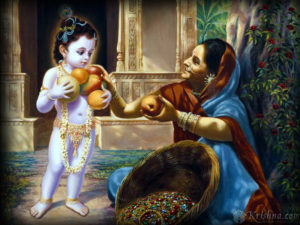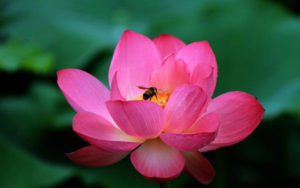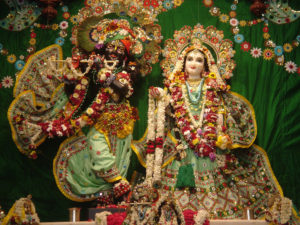Hare Krishna.
17th July, 2016. Gurgaon.
Looking to post my daily Srila Prabhupada quote I stumbled upon the beautiful chapter 22 of canto 8, describing pastime of Bali Maharaj. It was amazing to read how Krishna expertly, what else can we expect from Him, bestows opulence on His aspiring devotees. On one hand He grants a lot to some while on the other hand He takes away everything from others.
It is a misplaced perception that Krishna does not grant opulence to His devotees, in fact His devotees receive limitless opulence, there are so many examples in Bhagavatam, Sudama, the fruit seller in Mathura, Dhruva… Bhagavatam also spells out why and why not. As usual it all boils down to our consciousness, or lack of it. Here are some keys.
Opulence comes by the will of the Supreme Lord.
My dear King, Bali Maharaj donated all his possessions to the Supreme Personality of Godhead, Vämanadeva, but one should certainly not conclude that he achieved his great worldly opulence in bila-svarga as a result of his charitable disposition. The Supreme Personality of Godhead, who is the source of life for all living entities, lives within everyone as the friendly Supersoul, and under His direction a living entity enjoys or suffers in the material world. Greatly appreciating the transcendental qualities of the Lord, Bali Maharaj offered everything at His lotus feet. His purpose, however, was not to gain anything material, but to become a pure devotee. For a pure devotee, the door of liberation is automatically opened. One should not think that Bali Maharaj was given so much material opulence merely because of his charity. When one becomes a pure devotee in love, he may also be blessed with a good material position by the will of the Supreme Lord. However, one should not mistakenly think that the material opulence of a devotee is the result of his devotional service. The real result of devotional service is the awakening of pure love for the Supreme Personality of Godhead, which continues under all circumstances.
(SB 5.24.19)
Look, who is directly serving Krishna and His devotees.
Devotional service to the Lord is likened unto a queen. When a queen gives an audience, many maidservants follow her. The maidservants of devotional service are material opulence, liberation and mystic powers.
(SB 4.23.11p)
According to the desire of Laxmi Devi, the goddess of fortune, the Supreme Personality of Godhead made His bosom her residence so that by her glance she could favor everyone, including the demigods and ordinary human beings. In other words, since the goddess of fortune stays on the bosom of Narayana, she naturally sees any devotee who worships Narayana. When the goddess of fortune understands that a devotee is in favor of devotional service to Narayana, she is naturally inclined to bless the devotee with all opulences. The karmi’s try to receive the favor and mercy of Laxmi, but because they are not devotees of Narayana, their opulence is flickering. The opulence of devotees who are attached to the service of Narayana is not like the opulence of karmi’s. The opulence of devotees is as permanent as the opulence of Narayana Himself.
(SB 8.8.25p)
But opulence should be utilised properly
Material achievements are not the ultimate goal of devotional service. The ultimate goal of devotional service is love of Godhead. Therefore although Prahlada Maharaj, Dhruva Maharaj, Ambarish Maharaj, Yudhishthira Maharaj and many devotee kings were materially very opulent, they accepted their material opulence in the service of the Lord, not for their personal sense gratification. Of course, possessing material opulence is always fearful because under the influence of material opulence one may be misdirected from devotional service. Nonetheless, a pure devotee (anyabhilasita–sunyam [BRS 1.1.11]) is never misdirected by material opulence. On the contrary, whatever he possesses he engages one hundred percent in the service of the Lord. When one is allured by material possessions, they are considered to be given by mäyä, but when one uses material possessions fully for service, they are considered God’s gifts, or facilities offered by Krishna for enhancing one’s devotional service.
(SB 7.10.1)
Those who are in a better position in the world, having sufficient wealth, should especially take lessons from Manu, who acknowledged his kingdom and opulence to be gifts from the Supreme Personality of Godhead and thus always engaged in devotional service. Similarly, the descendants of Manu, or human beings, especially those who are situated in a well-to-do condition, must consider that whatever riches they have are gifts from the Supreme Personality of Godhead. Those riches should be utilized for the service of the Lord in sacrifices performed to please Him. That is the way of utilizing wealth and opulence. No one can achieve wealth, opulence, good birth, a beautiful body or nice education without the mercy of the Supreme Lord. Therefore, those who are in possession of such valuable facilities must acknowledge their gratefulness to the Lord by worshiping Him and offering what they have received from Him. When such acknowledgement is given, either by a family, nation or society, their abode becomes almost like Vaikuntha, and it becomes free from the operation of the threefold miseries of this material world. In the modern age the mission of Krishna consciousness is for everyone to acknowledge the supremacy of Lord Krishna; whatever one has in his possession must be considered a gift by the grace of the Lord. Everyone, therefore, should engage in devotional service through Krishna consciousness. If one wants to be happy and peaceful in his position, either as a householder or citizen or member of human society, one must promote devotional service for the pleasure of the Lord.
(SB 3.22.31p)
Our focus should remain in serving Krishna.
Maharaj Ambarish was the emperor of the entire world, but he considered his opulence temporary. Indeed, knowing that such material opulence is the cause of downfall into conditional life, he was unattached to this opulence. He engaged his senses and mind in the service of the Lord. This process is called yukta-vairagaya, or feasible renunciation, which is quite suitable for worship of the Supreme Personality of Godhead. Because Maharaj Ambarish, as the emperor, was immensely opulent, he performed devotional service with great opulence, and therefore, despite his wealth, he had no attachment to his wife, children or kingdom. He constantly engaged his senses and mind in the service of the Lord. Therefore, to say nothing of enjoying material opulence, he never desired even liberation.
(SB 9.4 summary)
A devotee’s opulence is eternal!
One should engage in full devotional service. Then, even though he has no desires, whatever desires he previously had can all be fulfilled simply by his worship of the Lord. The actual devotee does not desire even liberation (anyabhilasita–sunyam [Bhakti-rasämrita-sindhu 1.1.11]). The Lord, however, fulfills the desire of the devotee by awarding him opulence that will never be destroyed. A karmi’s opulence is destroyed, but the opulence of a devotee is never destroyed. A devotee becomes more and more opulent as he increases his devotional service to the Lord.
(SB 6.18.74p)
So when does Krishna gives opulence to His devotees
When in spite of possessing all these opulences a person is not proud, this means that he is fully aware that all his opulences are due to the mercy of the Supreme Personality of Godhead. He therefore engages all his possessions in the service of the Lord. A devotee knows very well that everything, even his body, belongs to the Supreme Lord. If one lives perfectly in such Krishna consciousness, it is to be understood that he is especially favored by the Supreme Personality of Godhead. The conclusion is that one’s being deprived of his wealth is not to be considered the special mercy of the Lord. If one continues in his opulent position but does not become unnecessarily proud, falsely thinking that he is the proprietor of everything, this is the Lord’s special mercy.
(SB 8.22.26p)
And when does Krishna NOT bestow opulence on a devotee? (Aha!)
Krishna, knows that many great personalities have fallen from their positions because of extravagant opulence. Therefore, even when His devotee asks for some opulence from Him, the Lord sometimes does not give it. He is very cautious about His devotees. Because a devotee in an immature position of devotional service may, if offered great opulence, fall from his position due to being in the material world, the Lord does not offer opulence to him. This is another manifestation of the causeless mercy of the Lord upon His devotee. His first interest is that the devotee not fall. He is exactly like a well-wishing father who does not give much wealth into the hand of his immature son, but who, when the son is grown up and knows how to spend money, gives him the whole treasury house.”
(KB, chapter 81)
Hence mature devotees receive various facilities.
If one is placed in material opulence due to the special mercy of the Supreme Personality of Godhead, he should not consider that opulence a cause for bondage. When a mature devotee is blessed with material opulence, he does not become affected adversely, for he knows how to employ material opulence in the service of the Lord. There are many such examples in the history of the world. There were kings like Prthu Maharaj, Prahlada Maharaj, Janaka, Dhruva, Vaivasvata Manu and Maharaj Ikshvaku. All of these were great kings and were especially favored by the Supreme Personality of Godhead. If a devotee is not mature, the Supreme Lord will take away all his opulence. This principle is stated by the Supreme Personality of Godhead- yasyāham anugṛhṇāmi hariṣye tad-dhanaṁ śanaiḥ: “My first mercy shown to My devotee is to take away all his material opulence.” Material opulence detrimental to devotional service is taken away by the Supreme Lord, whereas a person who is mature in devotional service is given all material facilities.
(SB 4.30.19)
A devotee’s ultimate achievement is to take shelter of the lotus feet of the Lord in any one of the planets in the spiritual sky. As a result of rigid execution of devotional service, a devotee receives all material opulences if these are required; otherwise, the devotee is not interested in material opulences, nor does the Supreme Lord award them. When a devotee is actually engaged in the devotional service of the Lord, his apparently material opulences are not material; they are all spiritual. For example, if a devotee spends money to construct a beautiful and costly temple, the construction is not material but spiritual (nirbandhaù Krishna-sambandhe yuktaà vairägyam ucyate). A devotee’s mind is never diverted to the material side of the temple. The bricks, stone and wood used in the construction of the temple are spiritual, just as the Deity, although made of stone, is not stone but the Supreme Personality of Godhead Himself. The more one advances in spiritual consciousness, the more he can understand the elements of devotional service. Nothing in devotional service is material; everything is spiritual. Consequently a devotee is awarded so-called material opulence for spiritual advancement. This opulence is an aid to help the devotee advance toward the spiritual kingdom.
(SB 6.16.29p)
But a devotee himself remains neutral
A devotee is never distressed or satisfied by material opulence. His concern is how to please the Supreme Personality of Godhead. If, by the grace of the Supreme Lord, a devotee achieves extraordinary opulence, he utilizes the opportunity for the Lord’s service. He is not disturbed by the opulence.
(SB 5.6.1p)
The point is that we should not try to exchange loving service for material prosperity. If we are actually surrendered to the lotus feet of Krishna, our only desire should be to satisfy Krishna. That is pure Krishna consciousness. Surrender means not that we demand something from the Lord but that we completely depend on His mercy. If Krishna likes, He may keep His devotee in a poverty-stricken condition, or if He likes He may keep him in an opulent position. The devotee should not be concerned in either case; he should simply be very serious about trying to satisfy the Lord by rendering Him service.
(CC Madhya 22.39p)
Krishna knows what is best for each one of us.
“Krishna says, ‘If one engages in My transcendental loving service but at the same time wants the opulence of material enjoyment, he is very, very foolish. Indeed, he is just like a person who gives up ambrosia to drink poison. Since I am very intelligent, why should I give this fool material prosperity? Instead I shall induce him to take the nectar of the shelter of My lotus feet and make him forget illusory material enjoyment.’ “
If a devotee maintains some material desire and at the same time very sincerely desires to engage at the lotus feet of Krishna, Krishna may directly give him unalloyed devotional service and take away all his material desires and possessions. This is the Lord’s special favor to devotees. Otherwise, if one takes to Krishna’s devotional service but still has material desires to fulfill, he may become free from all material desires, as Dhruva Maharaj did, but this may take some time. However, if a very sincere devotee wants only Krishna’s lotus feet, Krishna directly gives him the position of shuddha-bhakti, unalloyed devotional service.
(SB 8.16.21p)
Devotees like Dhruva Maharaj, who was given unlimited material opulence, have the special mercy of the Supreme Personality of Godhead. Once Kuvera wanted to give Dhruva Maharaj a benediction, but although Dhruva Maharaj could have asked him for any amount of material opulence, he instead begged Kuvera that he might continue his devotional service to the Supreme Personality of Godhead. When a devotee is fixed in his devotional service, there is no need for the Lord to deprive him of his material opulences. The Supreme Personality of Godhead never takes away material opulences achieved because of devotional service, although He sometimes takes away opulences achieved by pious activities. He does this to make a devotee prideless or put him in a better position in devotional service. If a special devotee is meant for preaching but does not give up his family life or material opulences to take to the service of the Lord, the Lord surely takes away his material opulences and establishes him in devotional service. Thus the pure devotee becomes fully engaged in propagating Krishna consciousness.
(SB 8.22.27p)
What is real poverty for a devotee..
The results of devotional service are certainly not material benefits or liberation from material bondage. The goal of devotional service is to be eternally situated in the loving service of the Lord and to enjoy spiritual bliss from that service. One is said to be in a poverty-stricken condition when one forgets the Supreme Personality of Godhead. One has to end such a life of poverty in order to automatically end the miserable conditions of material existence. One is automatically liberated from material enjoyment when one tastes the service of Krishna. One does not have to endeavor separately for opulence. Opulence automatically comes to the pure devotee, even though he does not desire material happiness.
(CC Madhya 20.142)
All glories to Sri Guru and Gauranga.
All glories to Srila Prabhupada.






